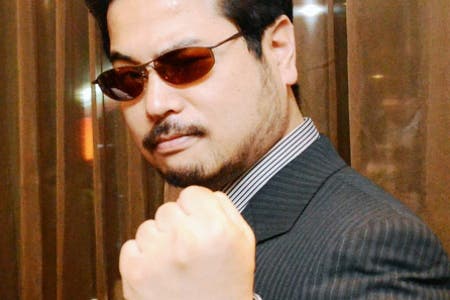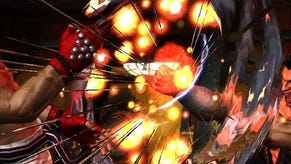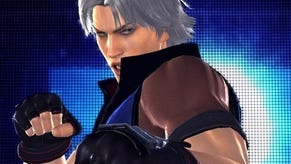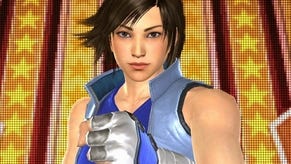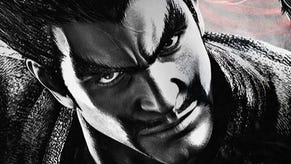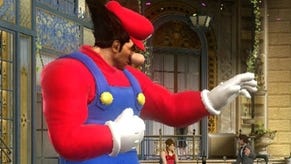Mr. Tekken: Behind the shades of the franchise chief
Harada-san on telling his bosses DLC should be free, fan abuse and why he might be next to collapse.
Katsuhiro Harada is Mr. Tekken. That much is clear simply from the way he strides onto the stage. He's clad in a leather jacket and thick black shades, even in the pitch darkness of the cinema auditorium.
"It's pretty cramped in here," he jokes, peering at the audience. "But at least that means Ono-san can't jump out at me again."
What's also clear is that, like his friend Street Fighter boss Yoshinoro Ono, Harada-san enjoys a joke. He quickly tears into Tales producer Hideo Baba, who's barely back in his seat from his own presentation before Harada's teasing him for being single. Harada looks around and realises he's speaking to an all-male gathering.
"Well, Baba also likes men," Harada declares, Baba's translator giggling in the front row. "And cats, and dogs," he adds. A pause. "Do you have pets?"
Later, sitting across from Harada-san in person, I find a franchise chief whose real persona is a lot more low-key but no less direct. The Neo-style shades are gone, replaced with simple spectacles. But his off-stage guise remains refreshingly honest, especially considering his place within the Namco Bandai machine.
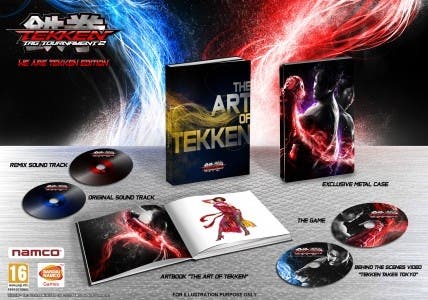
It's a fact I remind him of when recalling the public's last real glimpse at him: a strongly worded response to the "whining and complaining" fans who were militantly spamming his Twitter account, complaining that various Tekken voice actors had been changed. His response concluded with the prickly: "Thanks for understanding or not understanding. Whatever."
Harada nods. "Maybe 99 per cent of the fanbase I interact with on a daily basis are very normal and straightforward in their opinions. 'We like this, we don't like this.' It's very simple and easy to understand, and it's good feedback. I didn't let it get to me at first, and if it was just me they were spamming it wouldn't be an issue.
"But they started spamming different game producers, other people I follow on Twitter, non-games related people, even friends, telling them 'Please tell Harada to do this or that'. It was quite embarrassing they were doing this, so I really wanted to stop it. And at the same time, I explained the reasons why the voice actors had changed."
"Adhering to fan requests means more work, which means people don't get the game in their hands as fast as they like. It's very difficult."
Harada was surprised by the reaction: a general show of support for his reason, despite his barbed tone. "I thought people would think I shouldn't have spoken so strongly. There was that opinion, but the majority understood that what I was saying was right."
The issue of gamer entitlement recently hit the headlines with BioWare's release of the Mass Effect 3: Extended Cut, while Nintendo boss Reggie Fils-Aime branded fans as "insatiable" while defending claims his company's E3 showing was lacklustre. How damaging can bowing to fan demands be?
"Reggie-san was mentioning that there's really no end to the requests and expectations from fans, and that I can agree with," Harada agrees, popping a mint into his mouth. "It's impossible to please everyone 100 per cent. 99 per cent is maybe possible, by implementing requested features in your game. But you run into problems with securing staff for development. Adhering to fan requests means more work, which means people don't get the game in their hands as fast as they like. It's very difficult.
"But with Tekken Tag Tournament 2 we have really gone above and beyond what we normally do for fans on this project. Maybe 99 per cent satisfaction can be achieved."
One aspect that Tekken fans have praised is Harada's firm stance against paid-for DLC characters and on-disc DLC. Can Harada keep to this stance, despite yet more Tekken DLC characters in the offing?
"When you look at DLC, whether paid or free, a lot of titles have it on the disc, it's not that unusual. I've been saying that, at least for Tekken, regarding techniques, characters and stages, these three things won't be charged for, even if they are DLC,."
But some on-disc DLC may be necessary, Harada hints.
"How much money can we make? They are a company, obviously, in it to make money. "
"Saying that, if someone has a particular character they've downloaded and they play someone who doesn't have that character, it might take five minutes for the person to then download the data to play against this person. This wouldn't be very realistic and wouldn't give a very favourable impression, so we do plan to address these issues. So some content may be on the disc, some might not. But since it's free it shouldn't be an issue."
Harada pauses, talks with his translator, and begins like a man wanting to get something off his chest.
"Actually this is something my bosses have been asking me for quite a while now - what are our plans for DLC? How much money can we make? They are a company, obviously, in it to make money. So it's something I'm continually asked even now. But I haven't changed my stance. If you're making a fighting game, all of the elements necessary to enjoy it should be on the disc, or should at least be available for free."
It's a tough line to take, and surely the company's money men must be looking for extra cash to come from somewhere? It turns out that's true. Harada is considering paid DLC for other types of items. The distinction being that these would be extraneous to the core Tekken Tag Tournament 2 package.
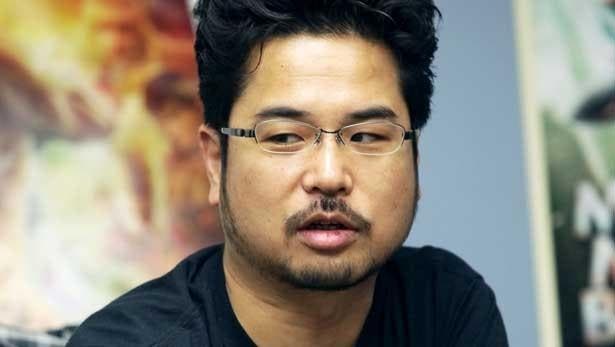
"If there's something that's not necessary, if it just enhances the entertainment value..." Harada begins to explain. "For example, a lot of fans have been asking for previous soundtracks. Fans have said they'd want to buy that. So maybe if we make those available, or some of the past ending movies... These are ideas that aren't essential to enjoy the game, and might be available for purchase."
And if his bosses said that wasn't enough? "If I was given the choice to include paid DLC or quit Namco, I would maybe quit... Or maybe I would just say 'get someone else to deal with this'," he adds, popping another mint into his mouth.
"As far as vacation days go, I can only take one or two off all year."
The current climate of DLC, limited editions and retailer-exclusive add-ons is very different to the one which existed when Harada began working in games more than 17 years ago. This interview is but one of dozens on today's conveyor-belt of journalists and Harada flies to Germany in a few hours to do it all over again tomorrow. I ask him whether he ever feels like his friend Ono: overworked.
"It's funny you mention that, I was on that business trip with Ono-san just before he collapsed. It happened soon after we left each other at the airport. I heard about it later that evening after trying to get in touch with him...
"I do have a lot on my plate. We have a company policy called Refresh Week," he explains with a wry smile.
"It's four weeks throughout the year when we have to go home early. And I'm feeling stressed out just trying to do that! As far as vacation days go, I can only take one or two off all year. Having four weeks throughout the year where I can't do any overtime is quite difficult.
"So," he says, recalling Ono's collapse, "I'm kind of worried I'll be next."
